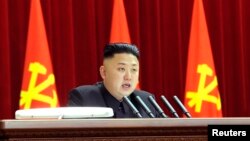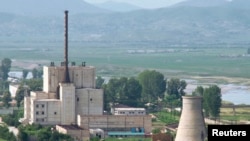Analysts say it is too soon to tell how North Korea's decision to resume operations at a shuttered plutonium nuclear reactor and further uranium enrichment will impact Pyongyang's nuclear weapons program.
It would take about six months to get the plutonium reactor at the Yongbyon nuclear complex running again, estimates Mark Fitzpatrick, director of the London-based IISS's non-proliferation and disarmament program.
"The danger is that if North Korea could get the small reactor going again, they could resume the plutonium production program that has been the basis of their nuclear weapons program to date," says Fitzpatrick. "But we're not looking at an immediate production of plutonium."
North Korea agreed to mothball the plutonium reactor and destroy its cooling tower as part a 2007 aid-for-disarmament deal at the now-stalled six-party talks. A spokesperson was quoted Tuesday in state media as saying work on the facility would begin immediately.
Once it is up and running, it would take at least a year of restarted operations to generate enough plutonium to make one nuclear bomb, say nuclear scientists. Pyongyang is currently believed to have enough plutonium to make up to eight bombs.
But it is less clear what to make of North Korea's threat to "restart and readjust" its uranium enrichment facility at Yongbyon. Fitzpatrick says the danger is that the facility, which was first unveiled in 2010, could give Pyongyang an easier way to make nuclear weapons.
"Highly enriched uranium is also easier to conceal from observation. The enrichment can take place in small facilities that don't give off any obvious heat signature or any release of radiation, unlike plutonium, which has to be produced in a reactor that is observable from the sky," says Fitzpatrick.
But Remco Breuker, professor of Korean studies at Leiden University in the Netherlands, says Western nations should not overreact to the news of revamped nuclear activity.
"There's no immediate danger," says Breuker, who warns that both sides should take care to not let the situation escalate further. "What I am afraid is that there doesn't seem to be an end to these escalations and there's no guarantee that this won't spin out of control at one point or another."
It would take about six months to get the plutonium reactor at the Yongbyon nuclear complex running again, estimates Mark Fitzpatrick, director of the London-based IISS's non-proliferation and disarmament program.
"The danger is that if North Korea could get the small reactor going again, they could resume the plutonium production program that has been the basis of their nuclear weapons program to date," says Fitzpatrick. "But we're not looking at an immediate production of plutonium."
North Korea agreed to mothball the plutonium reactor and destroy its cooling tower as part a 2007 aid-for-disarmament deal at the now-stalled six-party talks. A spokesperson was quoted Tuesday in state media as saying work on the facility would begin immediately.
Once it is up and running, it would take at least a year of restarted operations to generate enough plutonium to make one nuclear bomb, say nuclear scientists. Pyongyang is currently believed to have enough plutonium to make up to eight bombs.
But it is less clear what to make of North Korea's threat to "restart and readjust" its uranium enrichment facility at Yongbyon. Fitzpatrick says the danger is that the facility, which was first unveiled in 2010, could give Pyongyang an easier way to make nuclear weapons.
"Highly enriched uranium is also easier to conceal from observation. The enrichment can take place in small facilities that don't give off any obvious heat signature or any release of radiation, unlike plutonium, which has to be produced in a reactor that is observable from the sky," says Fitzpatrick.
But Remco Breuker, professor of Korean studies at Leiden University in the Netherlands, says Western nations should not overreact to the news of revamped nuclear activity.
"There's no immediate danger," says Breuker, who warns that both sides should take care to not let the situation escalate further. "What I am afraid is that there doesn't seem to be an end to these escalations and there's no guarantee that this won't spin out of control at one point or another."





